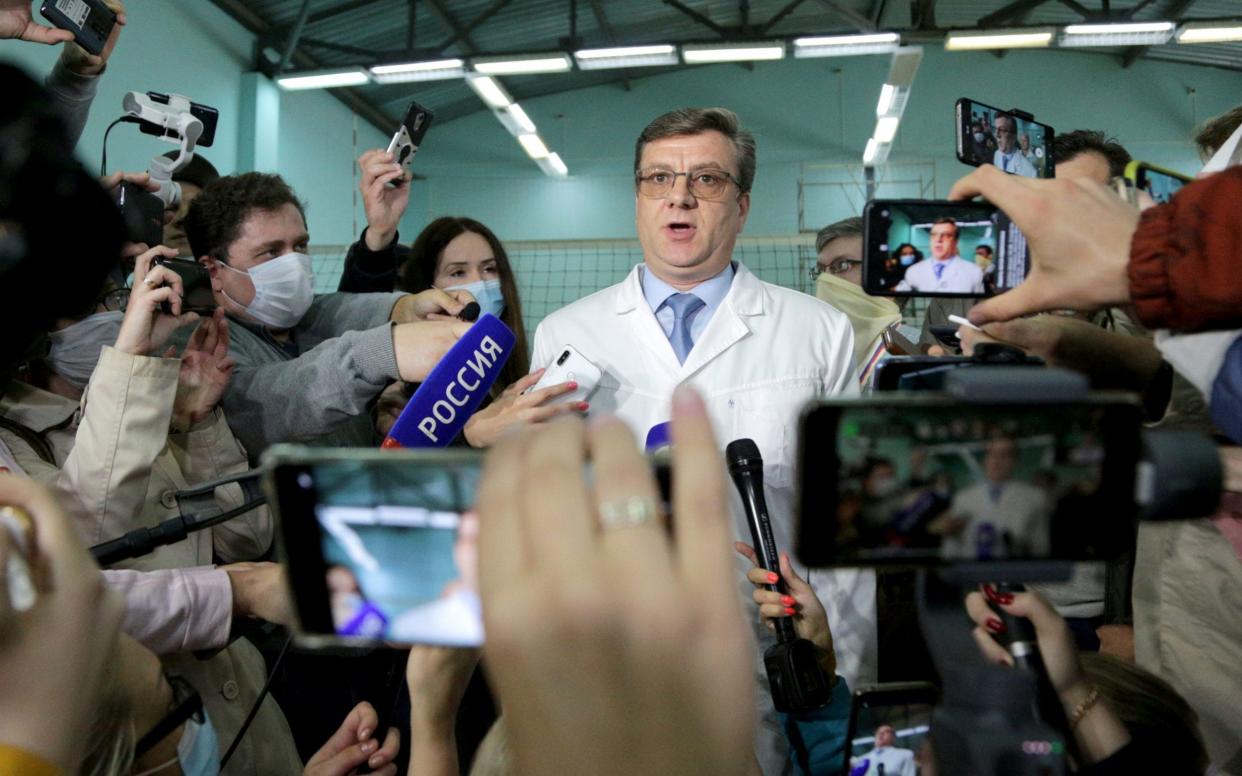Kremlin critic Alexei Navalny arrives at Berlin hospital from Russia for emergency treatment

An ambulance carrying gravely ill Kremlin critic Alexei Navalny arrived at Berlin's Charite hospital on Saturday, shortly after a plane that carried him from Russia landed at one of the German capital's airports.
Mr Navalny, Russia’s most outspoken critic of President Vladimir Putin, was hospitalised on Thursday and remained unconscious after suddenly falling ill during a flight to Moscow from Siberia.
His wife Yulia personally appealed to Mr Putin to allow him to travel after doctors refused her request for most of the day, saying his condition was unstable, before reversing their decision.
Several of Mr Navalny’s aides said the doctors deliberately delayed so that foreign medics would be unable to discover any toxins in his system, and were taking instruction from Russian officials.
Spokeswoman Kira Yarmysh called the delay “an attempt on his life”. Angela Merkel, the German chancellor, and Emmanuel Macron, the French president, have expressed concern over the apparent poisoning, while US Democratic candidate Joe Biden called it “unacceptable”.
After Mr Navalny's arrival in Germany, Ms Yarmysh said: "The fight for Alexei's life and health are just beginning. There is still much to do but this is at least a first step."
Ms Yarmysh said a team of German doctors were allowed to see Mr Navalny in the Russian hospital on Friday afternoon, but were barred from talking with his family. Supporters had been in contact with a German NGO which arranged for his transfer.
The hospital, in the Siberian city of Omsk where the plane was forced to make an emergency landing after Mr Navalny began crying out in pain on Thursday, saw a heavy police presence.
Georgy Alburov, who works at the opposition leader’s anti-corruption organisation, wrote on Twitter: “It feels like we are organising a jailbreak for Navalny, not trying to move him from hospital to hospital.”
Earlier in the day, Ivan Zhdanov, head of the anti-corruption organisation, said officials had found a substance in Mr Navalny’s system that was dangerous “not only to Alexei, but also for those around him, and that everyone should be in protective suits”.
But doctors later appeared to backtrack, telling journalists no evidence had been found to suggest a poisoning. Hospital head Alexander Murakhovsky said Mr Navalny had been diagnosed with a likely metabolic disease caused by low blood sugar, which may have caused his collapse on a flight.
Lyubov Sobol, a lawyer and key ally of Mr Navalny who has worked with him for ten years, told the Telegraph her colleague was “strong as an ox” and had never suffered from the condition the Siberian doctors described.
Officials at the hospital were “literally running away” from Mr Navalny’s team in order to avoid giving them any information, she said. Some protesters have held pickets in Moscow and other Russian cities in support of Mr Navalny, but Ms Sobol said there were no plans yet to call for larger demonstrations.
Mr Navalny’s spokeswoman alleged he was poisoned from a cup of tea at the airport before boarding the flight to Moscow.
Video taken by another passenger on the flight shows stewards with first aid kits walking to treat a man crying out in pain. In another video, Mr Navalny is shown being transferred on a stretcher to an ambulance waiting on the tarmac. Activists and journalists have been repeatedly attacked in Russia, including former opposition leader Boris Nemtsov who was killed in a drive-by shooting near the Kremlin five years ago.
Berlin's Charite Hospital, where Mr Navalny is set to be treated in Germany, is one of the country's foremost teaching hospitals. It is where Russian activist Petr Verzilov was treated when he was flown out of Russia after falling ill from a suspected poisoning in 2018.

